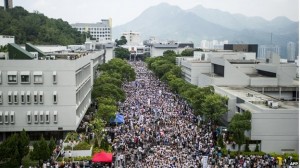2014-07-10

An undated photo of activist Lu Gengsong.
Authorities in the eastern Chinese city of Hangzhou have once more detained a veteran pro-democracy activist on suspicion of subversion, his wife and rights groups said.
Activist and member of the banned opposition China Democracy Party (CDP) Lu Gengsong was criminally detained by Hangzhou police on Monday on suspicion of “incitement to subvert state power.”
However, his wife said the move was likely a form of retaliation for Lu’s advocacy work on behalf of ordinary people with grievances against the ruling Chinese Communist Party.
“Lu Gengsong came to see me at my workplace at around 8:00 p.m. [on Monday], and the police took him away as he was coming out,” Lu’s wife Wang Xue’e told RFA.
“The police didn’t give us a reason.”
According to a copy of the police detention notice seen by RFA, Lu is currently being held at the Hangzhou detention center.
Wang said more than 20 officers had then searched the couple’s home, seizing a computer and two cell phones.
“The Hangzhou police didn’t send the notification of criminal detention to us until Tuesday morning,” Wang said.
The charge against Lu, 58, was listed as “incitement to subvert state power,” she added.
She said she planned to hire top rights attorney Mo Shaoping to defend Lu.
“That’s what Lu Gengsong told the state security police, and they gave me the message,” Wang said.
Recent posts
Meanwhile, fellow CDP activist Chen Shuqing said Lu’s detention could be linked to recent posts he had made online regarding rampant official corruption.
“My guess is that this something to do with articles Lu Gengsong posted online in recent days about corrupt officials, and also his reporting on the cases of petitioners in Jiangsu province,” Chen said.
Chinese president Xi Jinping has launched a nationwide anti-graft crackdown, targeting high-ranking “tigers” and low-ranking “flies,” since coming to power in November 2012.
But the party regards any popular involvement in the anti-corruption campaign as highly sensitive and potentially threatening, and has sentenced a number of activists to jail for calling on officials to reveal their wealth.
Meanwhile, Sichuan-based rights activist Huang Qi said Lu had done a great deal of advocacy work on behalf of disadvantaged people in recent years.
“Starting in 2005, Lu Gengsong began working with us at Tianwang on some rights-defending activities,” Huang said. “He was then locked up on a trumped-up charge after he annoyed some people in the local government.”
“The authorities are using his online writings about democracy and his membership in the CDP as an excuse,” Huang said. “The authorities make a habit of interrogating him and searching his home under suspicion of incitement to subvert state power.”
Previous harassment
Lu was last detained under similar charges last November. His home was also searched and computers confiscated at that time, although he was later released under close surveillance.
According to the New York-based group Human Rights in China, the couple’s home has been under 24-hour surveillance since February, and Lu has been restricted to his home with limited freedom of movement.
Lu was sentenced by a Hangzhou court to four years’ imprisonment for “incitement to subvert state power” in February 2008, in a trial that Wang said took about 15 minutes.
A history graduate from eastern China’s Zhejiang University, Lu taught at a police college before being expelled in 1993 because of his pro-democracy activities.
Since then, he has published several books, and is best known for “A History of Chinese Communist Party Corrupt Officials,” published in Hong Kong in 2000.
The CDP was banned in 1998 and several of its founder members sentenced to lengthy jail terms for subversion the same year.
Rights record
Beijing has repeatedly hit out at international concern over its human rights situation, saying that only the Chinese people have the right to speak out on the subject.
But the authorities repeatedly detain and harass any activists who try to do so.
China signed the U.N. International Covenant on Economic, Social and Cultural Rights and the International Covenant on Civil and Political Rights in 1998, ahead of its bid to host the Olympics, but neither treaty has been ratified by its parliamentary body.
Reported by Gao Shan for RFA’s Mandarin Service, and by Grace Kei Lai-see for the Cantonese Service. Translated and written in English by Luisetta Mudie.

 Chinese authorities said they detained Mr Huang for “picking quarrels and provoking trouble”
Chinese authorities said they detained Mr Huang for “picking quarrels and provoking trouble” Activist Yang Maodong, also known as Guo Feixiong, is currently detained for allegedly disturbing public order
Activist Yang Maodong, also known as Guo Feixiong, is currently detained for allegedly disturbing public order Human rights lawyer and dissident Gao Zhisheng allegedly suffered abuse while in jail
Human rights lawyer and dissident Gao Zhisheng allegedly suffered abuse while in jail